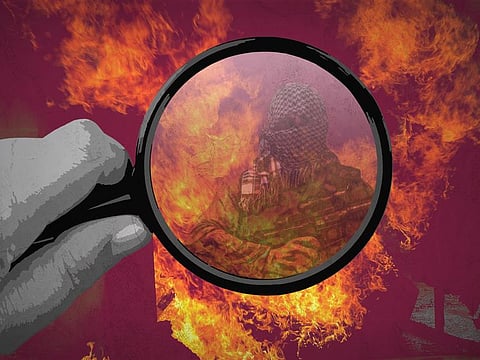The threat of Daesh not fully extinguished
Group’s resurgence, given destructive power it wielded in past, is a matter of concern

It was exactly three years ago, on Feb. 9, 2019, when we all thought that Daesh was dealt if not a mortal blow certainly a lethal one at the Battle of Baghuz, which took place in a town by the same name located in the Euphrates River Valley near the Syrian-Iraqi border.
We had every reason at the time to believe the battle was effectively the last stand by a dreaded group that at the peak of its power in 2015, merely a year after its founding as a mythical “Caliphate”, fielded 30,000 fighters and held sway over contiguous territories in Iraq and Syria the size of Britain, containing an estimated 12 million people. The language it spoke to those people, as to the rest of the world, was that of terror, mayhem and death.
No wonder then that we all let out a long sigh of relief in the wake of that momentous battle, for we convinced ourselves that we had seen the last of Daesh, that henceforth it would at best be able to burrow its way underground somewhere, becoming a ghost of its old self, a threat to us only as a grim memory, one that we may, at unguarded moments, evoke in our minds conjuring images of the havoc it wreaked on our region and beyond.
Also Read: Ukraine standoff triggers global anxiety
Also Read: Afghanistan needs a helping hand. Now
That was not to be. The beast is now back, claiming headline news for itself.
On January 20, Daesh militants, as if to make the statement that they lost neither the will to fight nor the ability to do so, launched a brazenly daring attack against a prison holding roughly 3,000 of their comrades in the town of Hassakbah in northeastern Syria, which triggered a 10-day battle that spilled into the streets and, by the time the fighting was over, resulted in the death of roughly 500 people.
And Daesh was yet headline news again when last Thursday its top Caliphnik for the previous three years, dubbed Abu Ibrahim al-Quraishi killed himself and his family as American commandos, in a predawn raid, closed in on the top floor of a three-story building where had secluded himself in northeast Syria.
If you’re scratching your head at the news of Daesh’s comeback to the front pages of international media, you’re another member of a large club of headscratchers who have in recent days stood and wondered, much in the manner of Horatio before Hamlet’s ghost, what visitations this one ghost, this blast from the past, as it were, may portend.
Resurgence for the group
First and foremost is the question of whether it portends the kind of resurgence for the group that would allow it to retrieve a semblance of the destructive power it had once wielded in the past.
United Nations field experts, it seems, appear to believe that in fact it does. In a report released last week, before the death of al-Quraishi, but compiled to cover the last three months of 2021, these experts claimed that Daesh remains a “potent” force in Iraq and Syria, the core region where it originated and where its resurgence, given the “instability” in these two countries “cannot be ruled out”.
Daesh is estimated today to retain roughly 8,000 fighters in both countries, where it is forming sleeper cells and training fighters in desert hideouts. In northwestern Syria, especially in the Idlib region, which is packed with millions of people who had fled other parts of the country, it has access to a large pool of recruits, among them young people growing under harsh conditions, alienated, angry and destitute — conditions that make them responsive to becoming Caliphniks ready to do the group’s bidding.
Fool’s errand of predicting the future
Look, UN experts, not unlike columnists who opt to run the proverbial fool’s errand of predicting the future, can be wrong. And in this case, this columnist hopes that he is.
But what we do know for sure, however, is that groups like Daesh, hell-bent on terror, at times purely for the nihilistic sake of diffusing terror, always find themselves able to operate freely in weak states, in regions poorly governed or wracked by conflict, in communities that evince scant regard for social justice and political freedom, places where the choked psyche of the individual gasps for air.
They operate freely, that is, in places where disgruntled youth are driven by the need of what organismic psychologists like Viktor Frank call the will-to-meaning. Men become so driven by that need that when they join a movement, be it terrorist, nationalist, socialist or whatever other ideological bent of mind characterises it, they agree to accept a diminished range of validity for the private self.
The search for meaning in life is surely the central motivating force in our human being. You want to call that a correlation between cause and effect, that is, a conjecture on whether Daesh rises or fails in our time, I’ll go along with you.
— Fawaz Turki is a journalist, academic and author based in Washington. He is the author of The Disinherited: Journal of a Palestinian Exile



